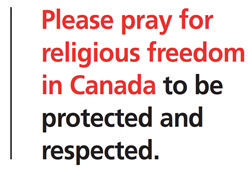Dear Friend,.png.aspx?width=250&height=300)
Should any government in Canada be able to refuse a public benefit to any law-abiding individual or group because their beliefs and values differ from those of the government?
Should any government in a free and democratic society be allowed to ask what political view you hold before deciding whether you should receive a government benefit or service?
A year ago, the federal government stipulated that only charities and small businesses that publicly affirmed that they shared the government’s stance on certain social and moral issues would be eligible to get public funding through the Canada Summer Jobs (CSJ) program.
For the first time, the government was compelling applicants to make an attestation to declare that both the job and the organization’s core mandate respect reproductive ‘rights’ (defined by the government as access to abortion), as well as other rights and values that were unspecified. (How can a religious organization commit to affirming rights and values that are not named?) Funding would be withheld from organizations that failed to make such a public declaration.
A record-setting 1,500 grant applications were rejected in 2018. A great number of applicants had refused to submit to the mandatory “values test.” Requests for religious accommodation were ignored. Many other groups declined to even apply. This had a huge impact on the ability of many faith-based organizations, including many EFC affiliates, to get the funds to hire students over the summer.
The EFC, along with other organizations and many churches and faith groups across Canada, repeatedly voiced our legitimate concerns until the federal government finally acquiesced to make changes to the 2019 Canada Summer Jobs application and guidelines.
The 2019 CSJ application no longer asks about a group’s “core mandate” or what rights and values it respects. Instead, under its eligibility criteria, any projects or jobs that “actively work to undermine or restrict a woman’s access to sexual and reproductive health services” or that “advocate intolerance, discrimination and/or prejudice” will be deemed ineligible. This change has made it acceptable for many faith-based organizations to apply for the grant this year.
Despite having removed the values test from this year’s application, the government is still facing nine separate lawsuits contesting the 2018 requirement. It is crucial that the attestation not go unchallenged because such unconstitutional, ideological tests should never again be imposed by any government while administering a public benefit program.
In the first case filed with the Federal Court of Canada, a pro-life organization has requested a judicial review of the government’s rejection of its CSJ funding application. It is challenging the government’s decision to impose the attestation because it violates the group’s freedom of expression, freedom of conscience and equality rights as protected by the Charter of Rights and Freedoms. Not being a religious charity, it is not raising freedom of religion violations. The case has yet to be heard.
Redeemer University College, an EFC affiliate, also filed for a judicial review with the Federal Court. Redeemer will argue that the government’s decision to make the attestation mandatory violates the university’s religious freedom as protected by the Charter.
In another case, Power to Change, another EFC affiliate, is requesting that the ministry organization receive the money it would otherwise have been granted under the 2018 CSJ program had the government accommodated its request to recognize its freedoms of religious and expression rights. Another Christian charity, one that provides support for refugees, is also challenging the government’s rejection of its application after it sought accommodation on the same grounds.
Finally, five businesses in Ontario and Alberta have each filed separate lawsuits with the Federal Court. One will argue that the attestation illegally forces businesses to publicly agree with the government’s ideology in order to qualify for a public program. Businesses are being compelled to say something they otherwise would not say and such “compelled speech” violates their Charter freedoms of conscience, thought and belief. The other businesses will argue that requests to accommodate their Charter rights were wrongfully ignored.
In December 2018, the federal government asked the Federal Court to pause all cases until the first case involving the pro-life group is settled. If the stay is not granted, the government may attempt to streamline the court proceedings. The EFC is collaborating with the Canadian Council of Christian Charities, Christian Legal Fellowship and other partners on a legal strategy. Decisions regarding the hearings are expected soon, so we need to be prepared to intervene in those challenges where our legal support will be most helpful and strategic.
Every minute spent praying and preparing is critical. We need your help now! Please pray for religious freedom in Canada to be protected and respected, for EFC affiliates and others to be able to continue to work for the good of our society without hindrance, and for God to be glorified. And please consider making a gift today in support of the EFC’s work in defending all of our religious freedoms. Your support is crucial to our success!
Sincerely,
Bruce Clemenger
President